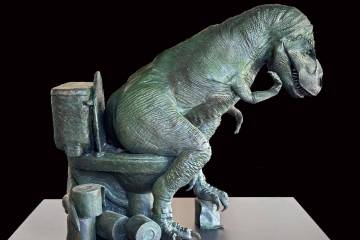‘Two Lovers’
Everyone's in the mood for escapism these days.
But escapism can take many forms -- at least at the movies.
Some, for example, will get away from workaday woes this weekend by visiting "Watchmen's" bloody, stylized comic-book universe.
Others, however, will take comfort in a less exotic alternate universe -- the one belonging to "Two Lovers," which kicks off the CineVegas film festival's screening series today at the Palms' Brenden Theatres.
It's the kind of movie that used to pop up with reassuring regularity in that long-ago Hollywood galaxy known as the '70s. The pre-''Jaws," pre-''Star Wars" '70s, that is, when low-concept, high-quality dramas focused on ordinary people -- as brought to life by extraordinary actors.
That description applies equally well to "Two Lovers," which qualifies as one of those "nothing happens" movies in which the only thing that blows up real good is the protagonist's battered heart.
And, in the case of Leonard Kraditor (Joaquin Phoenix), it's battered indeed -- as we discover in the movie's opening scene, when he takes a fully clothed jump off a beach pier one night, then flails away after deciding that he doesn't want to kill himself after all. At least not that night.
Given Leonard's circumstances, however, it's not out of the question entirely.
Recently split from his longtime fiancee, on medication to control his bipolar disorder, Leonard's taken refuge with his parents (Isabella Rossellini, Moni Moshikov) in Brooklyn's Russian-Jewish enclave of Brighton Beach, where he often sleeps the day away -- and half-heartedly helps out at his father's dry-cleaning business.
Except that it might not be his father's business much longer. A deal's afoot with another cleaner (Bob Ari) who wants to add Leonard's father's establishment to his empire. And this cleaner just happens to have a lovely wife (singer-actress Julie Budd, who once played Caesars with Sinatra) and an even lovelier daughter, Sandra (Vinessa Shaw), a nice Jewish girl who'd be perfect for Leonard. And vice versa.
Ah, but there's another girl -- definitely not perfect, especially not for Leonard -- who exerts an even more powerful pull.
It's Michelle (Gwyneth Paltrow), a new upstairs neighbor, who's trapped in a hailstorm of verbal abuse from her father when Leonard first spots her, in all her blond-goddess glory, and rescues her.
Michelle doesn't know Leonard's not the rescuing type; he's the type that usually needs rescuing himself.
But, in finding someone who's at least as screwed-up as he is -- Michelle's a drug-using clubber, involved with her married boss (Elias Koteas), who keeps promising to leave his wife and son -- Leonard discovers an unexpected capacity for gallantry. And, inevitably, an infinite capacity for heartache.
Despite the omnipresence of cell phones and text messages to cement the connection between Leonard and Michelle, "Two Lovers" almost feels as though it could have been made in an earlier era.
The movie's Brooklyn setting feels more timeless than timely, the kind of place that's always been there -- and always been like that.
It's a place director James Gray knows well, having set all three of his previous movies (1994's "Little Odessa," 2000's "The Yards" and 2007's "We Own the Night," the latter two starring Phoenix) in the neighborhood.
And the screenplay, by Gray and Ric Menello, has an even more vintage inspiration: Fyodor Dostoyevsky's short story "White Nights," which may help account for the movie's melancholy tone. (Gray and cinematographer Joaquin Baca-Asay, who also shot "We Own the Night," contribute melancholy images to match.)
As for its ambling, occasionally rambling pace, that's a challenge Gray never entirely solves. Lacking the crime-driven melodrama of his previous dramas, "Two Lovers" sometimes suffers from a lack of life-or-death tension -- at least as defined by contemporary movie audiences.
That's because "Two Lovers" pivots on its characters and their inner conflicts -- and takes the time to develop them, even at the risk of making audiences wait alongside the characters for some, any, emotional payoff.
Yet watching Leonard wrestle with one of life's most maddening questions -- which is better, wanting what you have or having what you want? -- proves undeniably (and sometimes surprisingly) compelling.
That's due, in large measure, to the pitch-perfect performances, from Rossellini's wary warmth to Koteas' smooth smugness. Shaw's earnest vulnerability, meanwhile, provides calm contrast with Paltrow's magnetic agitation. Her Michelle's the type of walking train wreck who can't help reaching out to take people down with her -- and she knows it. Sometimes she even revels in that power.
Yet Leonard doesn't care. After a lifetime of flailing, he's finally found someone who relies on him, not the other way around.
Phoenix captures Leonard's quiet yet undeniable upheaval with poignant, subtle precision; he's a lost soul desperate to find himself through someone at least as lost as he is, and Phoenix conveys a mixture of hope and desperation with every fumbling move and every darting of his restless eyes.
Phoenix has said that he's planning to give up acting to focus on a career in rap music. Given the heights he attains here, let's hope not.
But if so, what a way to go.
Contact movie critic Carol Cling at ccling@reviewjournal.com or 702-383-0272.
Carol Cling's Movie Minute
REVIEW
“Two Lovers”
110 minutes
R; sexual situations, profanity, brief drug use
Grade: B
at the Palms
DEJA VIEW
Whether Joaquin Phoenix is quitting acting, or acting like he’s quitting, there’s no denying his onscreen talent, as demonstrated in these titles:
“Gladiator” (2001) — Phoenix earned his first Oscar nomination as a murderous Roman emperor determined to punish a general (Oscar-winner Russell Crowe) opposed to his tyrannical reign.
“Buffalo Soldiers” (2003) — In this dark comedy, a wheeler-dealer Army clerk (Phoenix) stationed in Germany finds his operation threatened when a new commander (Scott Glenn) takes over for an oblivious predecessor (Ed Harris).
“Ladder 49” (2004) — A rookie Baltimore firefighter (Phoenix) learns the ropes from a veteran (John Travolta).
“Walk the Line” (2005) — Phoenix earned a second Oscar nomination for his portrayal of singer Johnny Cash opposite Oscar-winner Reese Witherspoon as June Carter.
“We Own the Night” (2007) — Phoenix collaborates with “Two Lovers” director James Gray on this crime drama about a Brooklyn nightclub manager caught between his mob bosses and his father (Robert Duvall) and brother (Mark Wahlberg), both cops.
— By CAROL CLING





























